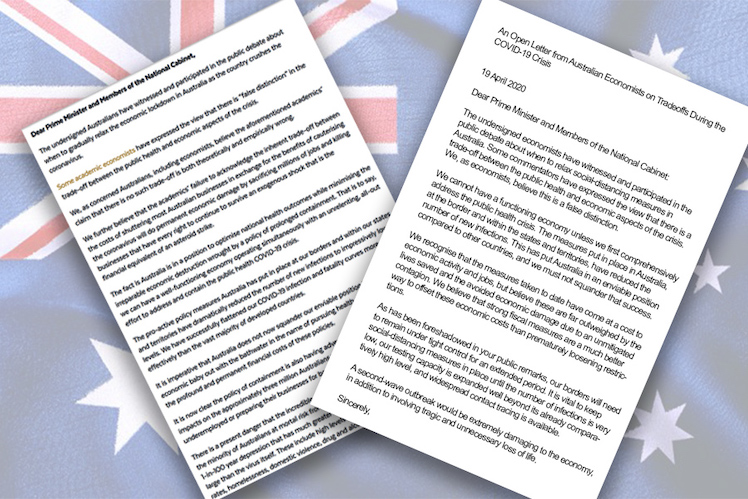A split between the nation’s economists is emerging over the immediate future of Australia’s COVID-19 lock-down. Marcus Reubenstein reports.
Australia continues to defy the trend of major first-world nations, with very low increases in both new COVID-19 infections and deaths. The question now is when should the Government relax social restrictions and how far should they go?
Not for the first time in this crisis, there’s been a split between state and federal governments. The National Cabinet – thus federal government policy – has broadly advocated staying the course signalling current restrictions will remain in place until at least May 11; but the states are going their own way.
Today, New South Wales announced from Friday groups of two adults would be permitted to visit other households and that children will be allowed to accompany adults for home visits.
Yesterday it was announced West Australians could gather in groups of ten, while non-contact recreational activities will be permitted. Queenslanders can travel up to 50 kilometres from their homes, visit national parks or have picnics with family members and Northern Territory national parks have also been opened up to campers.
Social relaxation is not releasing the stranglehold on the economy
Last week 280 economists from across all of Australia’s major universities wrote an open letter to the Federal Government and National Cabinet, arguing against any immediate relaxation of Australia’s lock-down policy.
They argue,
“We cannot have a functioning economy unless we first comprehensively address the public health crisis. The measures put in place in Australia, at the border and within the states and territories, have reduced the number of new infections.
“This has put Australia in an enviable position compared to other countries, and we must not squander that success.”

Open letters with opposing views.
The consensus among this large group of academics is there should be no trade-off between public health and supporting the economy.
Australia facing practical realities
Some in the financial markets feel the practicalities of the choices facing policy makers cannot be ignore. Says Michael McCarthy, Chief Market Strategist at CMC Markets:
“This view represents a group of non-practising economists. The fact is there is a trade-off, the economy has essentially been shut down, some businesses will not survive and many people will stay unemployed.
“As a market strategist, I prefer to get my commentary from economists who are at the coalface of business.”
Media say it’s black and white
The sharpest criticism of the university economists has come from sections of the media, some economic writers and political commentators, who have advanced the argument that Australia’s COVID-19 response is a trade-off in which the economy is taking a disproportionally large hit.
Professor Richard Holden from UNSW’s School of Business, one of the co-authors of the open letter, says he’s more than aware of the pain this shutdown is causing. “We may have secure jobs, but we’ve all had people close to us lose their jobs or have been forced to shut down their businesses.”
“This suggestion by some commentators that we don’t care about the economic harm of the lock-down is unwarranted and somewhat arrogant,” he says.
Professor Holden argues it makes no sense to separate the economic outfall from the health crisis. “Saying containment measures are a cause of the economic pain makes no sense.”
“If we had a major health crisis, the economy would be hit even harder than it has been already.”
Prof. Richard Holden, UNSW Business School
“Maintaining jobs and keeping businesses going is incredibly important but you need only to look at the experience of Spain, Italy, London and New York. They are taking a massive economic hit and it’s not because of lock-down measures, it is because the virus is out of control.”
A counter view
In direct response to the academics call for continued strong health measures another open letter to policy makers has been published. Among its signatories, former secretary to the Treasury, John Stone, former Queensland premier, Campbell Newman, and former advisers to prime ministers. John Howard and Julia Gillard.
They write, “We, as concerned Australians, including economists, believe the aforementioned academics’ claim that there is no such trade-off is both theoretically and empirically wrong.”
According to their open letter Australia has reached a tipping point, where the cost of continued shutdown would be
“…permanent economic damage by sacrificing millions of jobs and killing businesses that have every right to continue to survive an exogenous shock that is the financial equivalent of an asteroid strike.
“It is now clear the policy of containment is also having adverse social, health and other human impacts on the approximately three million Australians who are tragically unemployed, underemployed or preparing their businesses for bankruptcy.”
Melbourne businessman and letter signatory, David Chen says, “I feel strongly that the coronavirus situation in Australia is under control and the [low infection] numbers speak for themselves.
“Clearly a second outbreak is a damaging possibility for Australia but we are far better prepared now than when we faced the initial outbreak. With greater testing and improved tracing things can be far better managed.”
David Chen, Managing Director, YHI Power
This open letter advocates reactivating the economy as early as May, warning the consequences of continued shut-down could lead the economy down the path of a depression.
There is common ground
Lost in the discussion of these counterarguments is the fact there is agreement on the central issue that the Australian Government had to take drastic measures to control the COVID-19 outbreak.
Neither has substantially criticised the handling of the coronavirus outbreak. They agree on the flattening of the health curve. They diverge on the timeframe for re-starting the economy and are publicly imploring government to listen.
If the experience of other open letters, calling on the Government to address the issue of COVID-19 racism towards Asian Australians, is a guide. Perhaps both groups are likely to be ignored by the National Cabinet.
Says Michael McCarthy, “Market expectations are all over the place at the moment. It’s well understood that there needs to be caution about a potential second coronavirus outbreak in Australia and the damage that would cause.”
“If we can recover faster than our major peers then our economy is likely to attract far more investment and that will help us to restart.”
The academic and market economists are split on whether the end of the coronavirus pandemic will leave Australian in a short-term recession or an economic depression. There’s two things they agree on, the pandemic will lift and, in its place, will drop the biggest public debt burden our economy has ever seen.
You can follow articles by Marcus at APACNews.
——————
Marcus Reubenstein is an independent journalist with more than twenty years of media experience. He spent five years at Seven News in Sydney and seven years at SBS World News where he was a senior correspondent. As a print journalist he has contributed business stories to most of Australia’s major news outlets. Internationally he has worked on assignments for CNN, Eurosport and the Olympic Games Broadcasting Service. He is the founder and editor of China-focussed business website, APAC News.

